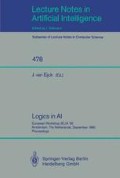Abstract
Constructive Matching (CM) is a methodology for proving by induction theorems which express formally specifications of programs, i.e., theorems of the form ∀ x ∃z Q(x,z). The principal feature of our methodology is its deterministic character.
We have applied this methodology to two basic problems in inductive theorem proving: (1) strategy for proving an atomic formula, and (2) strategy for solving a special kind of equations. In this paper we present our methodology and illustrate its explanatory character. In particular, we try to show that our method provides explanations, as much as possible, in terms of the original problem, which makes them understandable for the user and suitable for the system.
The paper uses the vocabulary presented in [10].
Preview
Unable to display preview. Download preview PDF.
References
R. Aubin: Mechanizing Structural Induction. Part 2: Strategies; Theoretical Computer Science 9, North-Holland, 1979, 347–362.
W. Bibel, K. M. Hoernig: LOPS — A System Based on a Strategical Approach to Program Synthesis; in [3], 69–91.
A. Biermann, G. Guiho, Y. Kodratoff (ed): Automatic Program Construction Techniques; Macmillan Publishing Company, London, 1984.
S. Biundo: Automated synthesis of recursive algorithms as a theorem proving tool; in [16], 553–558.
R. S. Boyer, J S. Moore: A Computational Logic; Academic Press, 1979.
A. Bundy, (ed): Proceedings of the Eigth International Joint Conference on Artificial Intelligence; August, Karlsruhe, 1983.
A. Bundy, F. van Harmelen, J. Hessketh, A. Smail, A. Stevens: A Rational Reconstruction and Extension of Recursion Analysis; in [23], 359–365.
N. Dershowitz: Synthesis by Completion; in [13] 208–214.
M. Franova: Fundamentals for a new methodology for inductive theorem proving: CM-construction of atomic formulae; in [16], 137–141.
M. Franova: Fundamentals of a new methodology for Program Synthesis from Formal Specifications: CM-construction of atomic formulae; Thesis, Université Paris-Sud, November, Orsay, France, 1988.
M. Franova: Explanations in Inductive Theorem Proving; to appear in proceedings of AAAI-90, 1990.
J. H. Gallier, W. Snyder: A General complete E-unification procedure; in [17], 216–228.
A. K. Joshi, (ed): Proceedings of the Ninth International Joint Conference on Artificial Intelligence; August, Los Angeles, 1985.
Y. Kodratoff, M.Picard: Complétion de systèmes de réécriture et synthèse de programmes à partir de leurs spécifications; Bigre No.35, October, 1983.
Y. Kodratoff, J. Castaing: Trivializing the proof of trivial theorems; in In 930.
Y. Kodratoff: Proceedings of the 8th European Conference on Artificial Intelligence; August 1–5, Pitman, London, United Kingdom, 1988.
P. Lescane, (ed): Rewriting Techniques and Applications; Proceedings, Lecture Notes in Computer Science 256, May, Springer-Verlag, Bordeaux, France, 1987.
Z. Manna, R. Waldinger: A Deductive Approach to Program Synthesis; ACM Transactions on Programming Languages and Systems, Vol. 2., No.1, January, 1980, 90–121.
W. Nutt, P. Réty, G. Smolka: Basic Narowing Revisited; J. Symbolic Computation No. 7, 1989, 295–317.
H. Perdrix: Program synthesis from specifications; ESPRIT'85, Status Report of Continuing Work, North-Holland, 1986, 371–385.
P. Réty: Improving basic narrowing techniques; in [17], 228–242.
D. R. Smith: Top-Down Synthesis of Simple Divide and Conquer Algorithm; Artificial Intelligence, vol. 27, no. 1, 1985, 43–96.
N. S. Sridharan: Proceedings of the Eleventh International Joint Conference on Artificial Intelligence; August 20–25 1989, Morgan Kaufmann, California, 1989.
C. L. Chang, R.Ch.T. Lee: Symbolic Logic and Mechanical Theorem Proving; Academic Press, New York, 1973.
M. Franova: PRECOMAS — An Implementation of Constructive Matching Methodology; to appear in proceedings of ISSAC-90, Tokyo, Japon, 1990.
Author information
Authors and Affiliations
Editor information
Rights and permissions
Copyright information
© 1991 Springer-Verlag Berlin Heidelberg
About this paper
Cite this paper
Fraňová, M. (1991). Constructive matching — A methodology for inductive theorem proving. In: van Eijck, J. (eds) Logics in AI. JELIA 1990. Lecture Notes in Computer Science, vol 478. Springer, Berlin, Heidelberg. https://doi.org/10.1007/BFb0018443
Download citation
DOI: https://doi.org/10.1007/BFb0018443
Published:
Publisher Name: Springer, Berlin, Heidelberg
Print ISBN: 978-3-540-53686-4
Online ISBN: 978-3-540-46982-7
eBook Packages: Springer Book Archive

